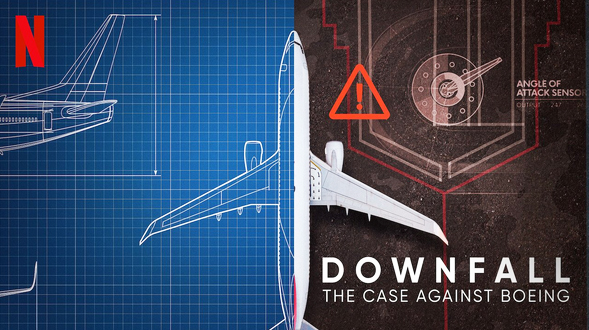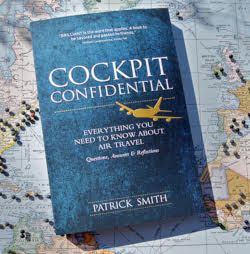Switched Off

April 14, 2022
I’M SUPPOSED to watch the much talked-about documentary, “Downfall,” about Boeing and the 737 MAX fiasco, and report back to you with my thoughts. The show keeps popping up in my Netflix stream. But I end up watching “Better Call Saul” instead.
As a general rule I shy away from aviation-related shows. Inevitably they’re over-the-top, misleading, or incomplete. They leave me annoyed and wanting to write letters to the producers. So, no, I haven’t seen “Downfall” and I have no plans to.
That’s not to say all such programs are poorly made. Comments I’ve heard from other pilots suggest they did a good job with this one. Which is nice to know, but still I’m in no hurry to find out. Plus, they didn’t invite me on the show.
Had they interviewed me, I would have voiced my opinion that central to Boeing’s boondoggle with the MAX was its decision to not build the 797. Instead of coming out with an all-new mid-sized airframe to replace its aging 757 and 767 models, they opted to force-feed the industry monsterized versions of the 737. Plans for the 797 should have been unveiled on the day the 757 went out of production, eighteen years ago.
Boeing claimed there wasn’t a big-enough market for such a jet, which is nonsense. The order backlog for advanced versions of the Airbus A321 proves it. The A321 isn’t half the plane the 797 would have been, but it’s the only one that sort of, kind of, fills that capacity and range niche. Hopefully “Downfall” at least touched on this.
Instead of me reviewing the program, I’ll let you do it, in the comments section below. Let us know what was good, bad, depressing, pleasing or disappointing. Maybe, even, you’ll convince me to watch it.
Related Stories:
BOEING’S BELEAGUERED JETLINER
THE PLANE THAT NEVER WAS.
ODE TO THE 757





Leave a Comment
Maximum 1500 characters. Watch your spelling and grammar. Poorly written posts will be deleted!
23 Responses to “Switched Off”
You are viewing newest comments first. Click to reverse order
I didn’t watch the Netflix version neither. But I saw the Frontline PBS version, as per usual of Frontline, it was good. Frontline was able to get insider talking and was able to explain technical details to the public clearly. They are never sensational. Just google “Boeing’s Fatal Flaw” PBS Frontline.
If Boeing had told the airlines that the MAX required new training, they would have sold fewer units — probably many fewer, possibly none at all. The problem is that (American? I don’t know about the rest of the world) accounting rules disincentivize training, because it is classified as an operational expense. Aviation and healthcare are the two major industries where the regulatory environment is partly successful in pushing back against that disincentive; in many other industries, training is essentially forbidden.
I followed the Max issue perhaps a bit too closely and read everything I possibly could about it — including arguments between engineers in contentious blogs. I watched the documentary when it came out and promptly forgot about it. Now, two things come to mind when reading the comments here. First, I forgot a lot of what I read about grandfathering the certification of the Max, but I seem to recall that the use of one sensor was related to certification and not a simple minded engineering oversight.
Finally, Patrick often reels at the antiquated nose of the 737, noting that its design dates back to the 1960s. I watched a good documentary on the creation of the 707 a few days ago and I was blown away at how different Boeing is as an engineering company today. I think one can find that infamous nose on the Dash 80, which first flew in 1954. I was watching the documentary because I was interested in the Lockheed Constellation, the most beautiful airliner ever built. Lockheed (and Howard Hughes at TWA) bet on propellers and the Constellation. Boeing bet on cutting-edge engineering and a jet that put the Constellation out of business and revolutionized air travel by the end of the 50s.
What Rapier said! I’m an over-credentialed automation guy who also deals with compliance issues but I wouldn’t expect such a shoddy design from an intern. The fact that the media couldn’t muster an understanding of this basic flaw and drill down to the exact chain of events that led to it is an indictment of the profession itself. We engineers do all sorts of things from haz-op studies to drawing revision and document reviews which contain the names of all the approvers – those names should have been unearthed and then those people should have been asked directly how this happened. The truth is that the FAA and FDA have been actively disempowered and understaffed to the point where Boeing executives thought (knew?) they would not be held accountable. If anyone wanted to they could still identify and indict the persons involved in the implementation of this non-redundant design, one that did not so much as indicate a discrepancy between the two existing AOA sensors while relying on only one of them to fly into terrain. This was a crime, not a mistake (almost certainly intended to conceal the impact of the design change) and the guilt goes all the way back to Congress, which decides whether or not to fund meaningful regulation and oversight – and then is shocked, shocked I tell you, when companies like Boeing cheat and break the rules.
Patrick’s lament about the lack of a 797 is fine but it is causal in only a meta sense. The documentary airs all the complaints about attitudes and even perhaps shoddy work but that doesn’t explain it either.
Without going into the lack of training aspect, the mistake was a bit of controls engineering so stupid as to be beyond belief. That is having a single angle of attack sensor be granted authority over a robotic control system (the wrong term probably but the gist should be right), without redundancy. The stupid part. The damn plane has two of them. It boggles the mind that many controls engineers worked on this system and it never occurred to them to have redundancy in the controls program, despite the fact they planes had two angle of attack sensors. Ya know, redundant sensors. Why would engineers ignore the redundancy built into the machine? I can’t understand it. It boggles my mind. It seems impossible considering the millions of hours that have gone into aircraft controls engineering since planes stopped being controlled by cables.
Agree with most of the sentimeent here. Like you Patrick, I was apprehensive about watching it, but when I did, came out thinking that for a documentary of this type it was reasonably fair.
The 737 Max affair has challenged many of my own beliefs about public perception of modern engineering. Compare to the Toyota auto-acceleration issue which ended up being all media hype and no substance. The damage done to a company that did no wrong.
I thought we would see the same deal here, but the longer it went on, the more it seemed there was true culpability at a corporate level.
It is one thing to maek an error on a product decision – A380/Sonic Cruiser ‘bluff’ worked out quite well for Boeing – but to compound the problem when the decision doesn’t work out is inexcusable.
I recently watched the documentary, and I quite liked it. Its primary focus is the corporate culture at Boeing after the merger with McDonnell Douglas, and how its primary focus went from engineering to profits, leading to all that followed: faulty MCAS, pilots not being told about it, etc. It also mentioned some of the recent production issues with the 787.
Boeing’s decision to build the MAX and not a clean-sheet design was briefly mentioned as well.
I didn’t find the doc to be sensationalist at all. The impact on the families of the victims, and what Boeing engineers’ feelings on the bean counters ruining their company, were shown, but not exaggerated.
In short, this documentary focuses on the downfall of Boeing, while showing the technical and human sides quite well. It also doesn’t end on a happy note; on the contrary, it closes off on a rather bleak note, distrustful of Boeing and the company they have become.
I hope this helped.
The documentary argues that the growing competition of Airbus was cutting into Boeing’s profit margin, so corporate management saw producing a whole new airplane, the 797, as too expensive and too risky. More profitable to build new versions of the 737.
Respectfully suggest you place your skepticism in a holding pattern, and watch the documentary. It’s got a bias towards the story it aims to tell, but is lacking sensationalism and provides aviation detail that will educate the general public without offending industry professionals. My only eye roll occurred when the animated airplanes accelerated on the runway as if launched by rubber band. So that’s a very minor detail indeed.
The doc could have been double its length had they explored in better detail WHY Boeing opted against a clean-sheet airplane, how they deceived customers & regulators during the MAX development, the lack of regulatory oversight itself, and the physics behind why MCAS was required in the first place. All these were touched upon; but very briefly, probably by necessity.
Looking forward to an askthepilot review soon.
Wrong. You missed the boat–er plane here. While the failure to build the 797, may be a factor, the main driving force, behind the fiasco, was deliberately lying and faking the testing, and trying to cover up.
I think there should have been a CRIMINAL investigation, and prison time. This was murder!!
The master’s eye fattens the horse…
Patrick I watched it…while flying home from Charlotte on a 737! This part of it did kind of make it scary, the main point that they didn’t want to put out the funds to train pilots on the MCAS is pretty scary. And the effect of loved ones carrying huge posters of the victims of the crashes right in front of the chairman of Boeing Doug somebody who retires with a $71M payment…. really well done film.
I watched the documentary and was left with the impression that it wasn’t telling me anything new.
If anything, it was too soft on the FAA. Too many stones hurled in Boeing’s way as if the agency could be cheated in its innocence.
First, it’s not just Boeing …
“Multiple alerts and indications in the cockpit can increase pilots’ workload and can also make it more difficult to identify which procedure the pilots should conduct. The NTSB notes that the Lion Air and Ethiopian Airlines accident pilots’ responses to multiple alerts and indications are similar to the circumstances of a 2009 accident involving Air France flight 447, an Airbus A330, which was traveling from Rio de Janeiro to Paris when it crashed in the Atlantic Ocean.”
Second, it’s complicated …
“Human factors research has identified that, for non-normal conditions, such as those involving a system failure with multiple alerts, where there may be multiple flight crew actions required, providing pilots with understanding as to which actions must take priority is a critical need.”
https://www.ntsb.gov/investigations/AccidentReports/Reports/ASR1901.pdf
Much more at the link.
All of these comments are true, and I would like to add: the movie’s main focus was the failure of the new business culture that resulted from the merger with McDonnell Douglas. This resulted in the engineers being moved from the center to the periphery of corporate concern in exchange for shareholder price becoming the new #1. I’ve read several accounts now of how Boeing rolled the dice with people’s lives by trying by hoping that they could create a software upgrade that would solve the problem before the next tragedy struck. Everything they could, would, or should have done in terms of the 797 is certainly germane, but this movie is specifically about Boeing’s failure to report and address the central flight control issue that caused the two crashes.
Thanks, but I’ll pass. I’ve become totally skeptical of most things that the infotainment industry puts out these days, and I’m not referring just to aviation topics. I won’t expand on that thought, as you’ve already received a political flame here.
I was really hesitant to watch it, thinking it was going to be a hatchet job on Boeing and nothing else. But I think they did a really good job of being fair and including all of the factors in the MAX story. No one came off looking very good – Boeing, the airlines, the FAA and the media. A couple of times I did find myself asking the TV “Well, that about…” only to have it answered later on.
As one who knows Patrick’s professionalism on a personal level, I vote to remove Simon from the island. This isn’t Facebook. We can have differing opinions without the name-calling.
Nope, can’t do it. My blood pressure can’t handle it.
Ah yes, another jab at Airbus. You haven’t even sat in an A321LR yet but you already know it “isn’t half the plane” some on-paper-plane-rumor would have been. Let’s note your type rating is for a 70s design that Boeing didn’t even bother replacing for two decades now. Meanwhile they went through burning Dreamliner batteries and crashing MAXes. You should reflect on that for a moment and then reconsider if you really want to shill for Boeing. At the very least, the typical Murica! Airbus bashing should be left to Trumpist mouth-breathers that sane people can readily avoid and ignore. Perhaps some levelheadedness would be appropriate for a senior professional with his own website to broadcast his musings to the world? I’d prefer to know the pilots commanding my flights remain above such petty nonsense.
How is this a “jab at Airbus,” and how am I a “shill for Boeing,” when my whole argument is that Boeing committed an enormous fuck-up by not building the 797? I’ve meanwhile written at some length about how the A321 is superior to the 737. See the story links at the bottom of the post.
A shill for Boeing? Petty nonsense? You even managed to invoke Donald Trump! What in heaven’s name are you talking about? And what does my type rating have to do with anything? This comment is unhinged.
The book Flying Blind by Peter Robison was far superior. I think the makers of the documentary use the Cliff’s Notes version as a script. Don’t waste your time with the Netflix show. Read or listen to Flying Blind for an excellent retelling of this sorry tale of the fall of a great American company.
When I was watching it, I thought of you during the section where they talk about, well, how instead of coming out with the 797, Boeing continued to wrangle the 737 into the frankenstein monster that was the MAX. I would say that the documentary is exceedingly sensitive to pilots — not even a whiff of “planes fly themselves” or “pilots are too dependent on automation to know what was going on.” If anything, I think the documentary went in the opposite direction, reminding people who might think that pilots only need to press a few buttons that if Boeing had let pilots hone their skills through training on the new system, it would have prevented the crashes from happening in the first place. I had a real problem with the Vanity Fair article about the Air France A330 crash for that reason. I’m not saying you should run out and watch it, since I don’t think anything in the doc would be news to you (Boeing losing its soul after the merger, lack of attention to quality control, Muilenberg is a sociopathic reptile, etc).